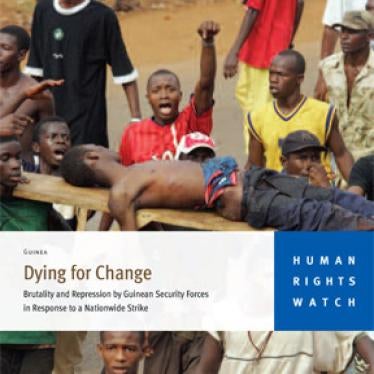(Dakar) – Guinea should require its security forces to use restraint in responding to street protests, Human Rights Watch said today, after security forces opened fire on groups protesting to demand lower fuel prices.
Protests on November 3 and 4, 2008 within the Guinean capital Conakry have left at least four people dead and some 20 wounded. According to witnesses interviewed by Human Rights Watch, numerous casualties occurred after the security forces opened fire on groups of protesters apparently in an attempt to disperse them. Members of the security forces also detained and beat numerous protesters, and robbed ordinary residents living within the affected neighborhoods, according to witnesses. At least one man was killed by a stray bullet.
“Once again, Guinea’s security forces have responded with excessive use of force, and once again lives have been senselessly lost,” said Corinne Dufka, senior West Africa researcher at Human Rights Watch. “Guinea’s new prime minister must stop these attacks and ensure that those responsible are investigated and brought to justice.”
Guinean security forces have an extremely poor record of dealing with demonstrators. In early 2007, security forces fired directly into crowds of unarmed demonstrators during a nationwide strike and gunned down others trying to flee to safety, leaving at least 137 people dead and more than 1,700 wounded. A commission of inquiry into the 2007 violence has yet to start work because the government has not provided funding. In June 2006, the government responded to demonstrations against rising prices of basic commodities with a brutal crackdown, during which the police and soldiers shot dead at least 13 unarmed demonstrators.
The current clashes began on November 3 in response to an earlier government announcement that it would lower fuel prices by 20 percent; demonstrators contended that the reduction fell well short of the drop in world oil prices. During the protests, some youths burned tires, set up barricades, blocked traffic and threw rocks at police and passers-by, resulting in some injuries. In response, the security forces, including police and soldiers, in several cases opened fire directly at the demonstrators, using live ammunition.
The violence took place in several neighborhoods, witnesses said. One witness told Human Rights Watch that the police and soldiers were “targeting youths and chasing them into private residences, firing indiscriminately.” Another witness described an incident on November 4: “From where I was hiding, I saw a youth gunned down by a soldier shooting at him with a long rifle. He was bleeding a lot when they took him away; I don’t know if he lived or not.” A resident of the Cosa neighborhood said military responding to unrest there on November 4 had fired at a group of youths, killing one and wounding another.
Sources interviewed by Human Rights Watch said the security forces subjected many of the dozens of youth they had detained to beatings and other forms of ill-treatment. One witness described seeing detainees held in a police station in Bellevue being beaten with pieces of a rubber hose. Other witnesses said security forces robbed residents and detainees of money and mobile phones, and looted several shops and businesses.
The Guinean government has clear legal obligations under several international and African human rights treaties, including the International Covenant on Civil and Political Rights and the African Charter on Human and Peoples’ Rights, to respect the right to life and freedoms of expression and assembly. Human Rights Watch called on the government to ensure that its forces fully respect these rights at all times. Where there is some evidence that persons have died as a result of actions carried out by security forces, there should be a public investigation and prosecution, both of those who carried out killings and those who gave the orders.
Human Rights Watch also called on the Guinean security forces to abide by the UN Basic Principles on the Use of Force and Firearms by Law Enforcement Officials in policing demonstrations. The principles require that law enforcement officials, in carrying out their duty, apply nonviolent means as far as possible before resorting to the use of force. Whenever the lawful use of force is unavoidable, law enforcement officials must use restraint and at all times minimize damage and injury, and respect and preserve human life. The UN Principles state that law enforcement agencies shall ensure that superior officers are held responsible if they know, or should have known, that law enforcement officials under their command resorted to the unlawful use of force and firearms, and they did not take all measures in their power to prevent, suppress, or report such use.







